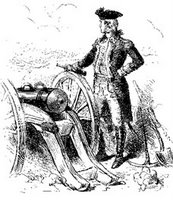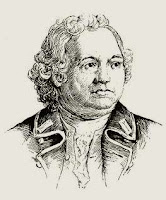Ezekiel Price: “Sand was mixt with the powder”
That moment was right after the Battle of Bunker Hill, before the provincials realized how much damage they had inflicted on the British troops. In those early days, people were looking around for someone to blame for losing the Charlestown peninsula.
Ezekiel Price was a Boston court officer and insurance broker who had taken up residence in Milton after the war broke out. He kept a diary recording lots of the gossip he picked up, including this news on Monday, 19 June 1775, two days after the battle:
Further reports relating to the unfortunate action at Charlestown,—that the Continental Army fought like lions, and mowed down the Regular Army as they approached the entrenchments, until their ammunition was expended, and until a fatal mistake (as I call it) was discovered,—that the cartridges and shot for the artillery proved wholly unfit for them, and could not be used; besides which, an opinion prevails among the Continental Army, that treachery was in some of the Continental officers. A suspicion also arises among them that sand was mixt with the powder, and that the cartridges and ball being thus sent was with design: all which creates great uneasiness in the camp.This rumor appears to have confined the problem of sand and gunpowder just to the cartridges, or bags of powder, supplied to the New England artillery, not to the entire army’s powder supply.
There had indeed been problems with the cartridges for Capt. John Callender’s artillery company: the cartridges sent out with his cannon were too large to fit into the barrels. But once provincial soldiers broke open those cartridges, the powder inside proved quite explosive.
The next day, Price discounted all those rumors on the basis of new rumors:
Heard that the Continental Army had received a fresh supply of powder, and that they were in high spirits; . . . that all the reports of treachery were entirely without foundation, and propagated by the enemies to the cause, and weak, discontented men, and by some cowards who fled from the engagement, and formed these lies to favor their escape from danger.Those counter-rumors might protest too much, but that would only confirm that we can’t treat all the tales Price recorded as reliable fact. Most likely, the suspicion about sand and gunpowder grew from an early attempt to explain why the provincial artillery regiment had performed so badly overall. Once more information spread, blame focused on Callender and other specific officers.
TOMORROW: One last mix of sand and gunpowder.



